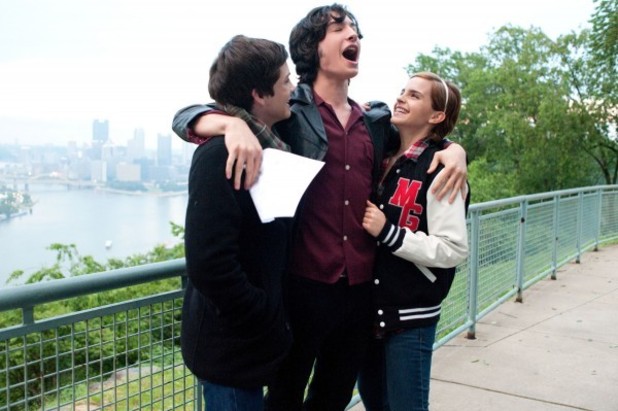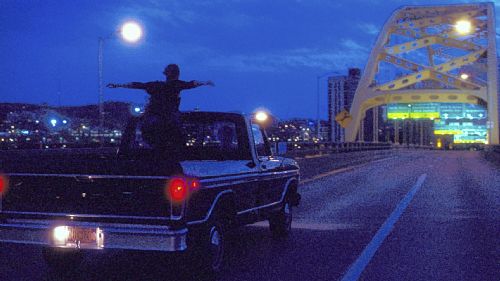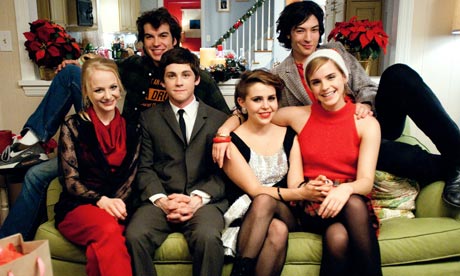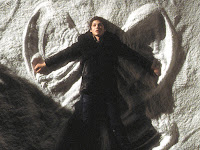Usually, romances based on Smiths mixtapes and friendships based on vinyl collections* are on the list of things that annoy me most in movies. However, “The Perks of Being a Wallflower” makes all these little obsessions feel authentic.
“The Perks of Being a Wallflower” is based on a novel that I now feel the need to read. This is a rare adaptation that was actually written for the screen by its original author. This is also the directorial debut for author Stephen Chbosky, who should spend more time directing movies in his future.
“The Perks of Being a Wallflower” deserves to be mentioned alongside many great classics about misfits in high school, from “Rebel Without a Cause” to “The Breakfast Club.” Based on the music, a very prominent feature here, “Perks” takes place in Pittsburgh during the early 1990s. Charlie (Logan Lerman) is a Holden Caufield-type with real problems. After some emotional issues and time spent in a hospital, Charlie returns to the real world in preparation for his freshman year of high school. Before I saw this film, I forgot how much high school tended to suck: the immaturity, the propensity for hurtful nicknames, and the culture of cliques. On his first day, Charlie can’t even eat lunch with his sister Candace (Nina Dobrev). So, he becomes a wallflower.

While the complicated love story might seem like the central motivation for most of Charlie’s actions, it is the friendship formed with Patrick (Ezra Miller) that opens Charlie’s eyes for the first time. Patrick, who is called “Nothing” by his classmates, spends most of his spare time messing with his shop teacher as well as anyone else he can find. He is also the only openly gay kid in the entire school, at a time when being open was not accepted by all. Patrick is played with a manic energy by Miller, who always moves his body around and yells with excitement when there’s nothing to be excited about. It surprises me that everyone wouldn’t want to follow in his footsteps.
When Charlie has no one to sit with at the football game, Patrick has no problem keeping him company. Patrick then takes Charlie under his wing and brings him to his first party. There, he accidentally eats a brownie filled with weed that finally gets him out of his head, and his witty thoughts amuse the exiles of the school, who are appropriately labeled “the island of the misfit toys.” Most importantly, it is here where Charlie meets Patrick’s step sister Sam (Emma Watson) and is on the path to first love. Not before he finishes that milk shake, though.
“Perks” is much more about how kids affect each other, as opposed to just how adults affect kids. The adult characters are just there in Charlie’s life, and they are almost an alien species that he can’t properly communicate with. We will find out why this is so later on. His parents are never given names. Charlie’s one true adult friendship is with his English teacher Mr. Anderson (Paul Rudd). I have a feeling that the book delves much deeper into their relationship, as the film shows no conflict in it, except for the fact that Mr. Anderson is always giving Charlie books, which Charlie reads in no time. Despite that, I still really liked this element in the film. It is not just because Paul Rudd is an incredibly likable dude, but because it felt meaningful and never trite.

It is really the young actors that shine brightest here. Watson can now be known as more than just Hermione Granger. Her American accent seems shaky at first, but she ends up sliding into it comfortably and then embodying a character who is both proud of who she is and uncomfortable with who she once was. As Charlie, Lerman is memorable yet understated. Charlie is a complicated character to get down, but Lerman nails it. While the story is told from Charlie’s perspective, there is the feeling that there is information that Charlie is withholding both from the audience and himself. This might be the first film I’ve ever seen in which the narrator is unreliable because he is lying to himself. I think that’s a little more radical than people have made it out to be.
“Perks” feels like a scattered collection of someone’s journal entries and memories that sprung to life with vivid sound and color. The film brings an entire time period to life, and it makes feel as alive as the present day. Its sense of place is evident in a scene where Sam stands in the back of Patrick’s truck as they pass through a tunnel and onto a bridge. Shockingly, it makes Pittsburgh seem more magical than industrial.
The film finds its sense of time in its soundtrack. The music selected is so good that after seeing the film, I immediately listened to the soundtrack, and then listened to it many more times. In terms of creating nostalgia, the soundtrack is on the same level as “Dazed and Confused” and “Almost Famous.” In the same way that I will always associate Foghat’s “Slow Ride” with the ride to get Aerosmith tickets and Elton John’s “Tiny Dancer” with a bus ride sing along, I will forever associate The Smiths’ “Asleep” and Dexy Midnight Runners’ “Come on Eileen” with mix tapes and such. The best part about a great soundtrack is when it can open your mind to new music. All I can say is that after first finding out the track listing, I had a lot more new artists to find on Spotify.
 |
| The exact moment that everyone who wasn’t already in love fell in love with Emma Watson. |
Now, there might be some people who find the idea of friendships and romances based on a love of movies and music to be a little impractical. This idea was parodied quite well in “500 Days of Summer.” Yet, it does not feel pretentious in “Perks” in the slightest bit. “Perks” is not about a group of people showing how cool they are because of their taste. It is about the ability to bond with others over shared cultural experiences. Sometimes, the words we speak can only do so much. Liking the same piece of art as someone else can bring out so much about one’s personality that they could never even speak. And yes, if you don’t like certain things, I may be judging you.
But I digress. It is hard for me to speak to those who have read the novel, because they have a much greater wealth of knowledge of these characters and this world than I do. But I can speak to “The Perks of Being a Wallflower” as a film. Every emotional punch hits as hard as it was fully intended to. It pulls out a late in the story twist that I did not see coming. I believe this was a story that was made to be told on film.
Oftentimes, the purpose of great art can be to create characters who are suffering and who are lonely. I believe this provides catharsis to those who went through these emotions at one point or are currently experiencing them. “The Perks of Being a Wallflower” will connect to everyone because no matter who you are, at some point in your life, you were once an awkward high school kid who didn’t quite know where you belonged.
*For the record (pun possibly intended): I like The Smiths and own a vinyl collection. I don’t know what that makes me.
 |
| “Her?” |









